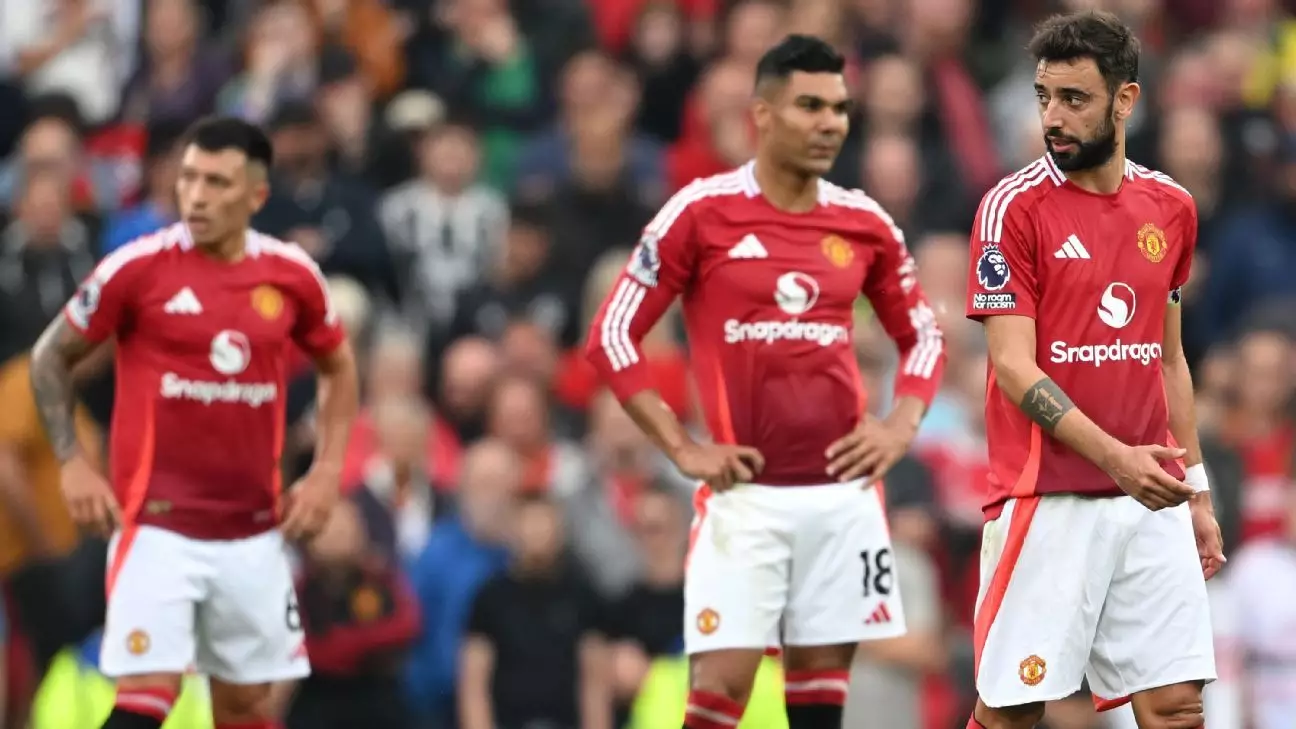As the international break looms, Manchester United finds itself at a crossroads, grappling with an alarming reality that marked the worst start to a Premier League season in the club’s illustrious history. Currently positioned in 14th place with merely two victories from their initial seven matches, the scrutiny intensifies on manager Erik ten Hag, whose tenure increasingly appears under siege. This predicament raises significant questions regarding the club’s leadership, tactical decisions, and recruitment strategy, revealing a narrative fraught with crises that echo far beyond the pitch.
With Sir Jim Ratcliffe’s Ineos Group taking a minority stake in the club, a new team of executives—including sport heavyweights like Dave Brailsford and Jason Wilcox—has been positioned to steer the club’s future. However, their inaugural board meeting presents a critical challenge: deciding whether to endorse Ten Hag’s position amid a backdrop of disappointing results. The conversation surrounding Ten Hag’s future has not just manifested since Ratcliffe’s monumental £1.25 billion investment; rather, underlying issues have persisted for over a year. The club’s performance troubles, compounded by a disheartening eighth-place finish last season, generate a potent mix of urgency and uncertainty.
Reports have circulated that potential replacements have been considered, including notable managerial figures like Thomas Tuchel and Mauricio Pochettino. Yet the club’s desperate turnaround, culminating in a surprise FA Cup win against rivals Manchester City, temporarily placated calls for Ten Hag’s dismissal. Nevertheless, this reprieve seems all the more questionable with the current trajectory indicating that a crucial decision must soon emerge within the boardroom.
An evident factor in United’s malaise has been a series of recruitment blunders—a long-standing issue that stretches back to the final years of Sir Alex Ferguson’s management. Despite Ten Hag’s initial promise, he has faced criticism for supporting purchases that have not borne fruit. For instance, Antony’s £85 million transfer from Ajax and Mason Mount’s £55 million acquisition from Chelsea have come under fire due to their underwhelming performances. The ultimate decision to bring in Rasmus Højlund in the summer of 2023 is contentious, especially when considering the alternatives such as Harry Kane and Ollie Watkins passed over for unknowns.
Underperformance from key signings has struck a dissonant chord at a club desperate for a top-tier goal scorer. Højlund, touted as United’s best option moving forward, has thus far amassed limited scoring impact. Ten Hag’s rationale of developing young talent fails to resonate when juxtaposed against immediate roster needs, particularly in a fiercely competitive league where veteran presence can prove pivotal.
Managerial Tactics: A Stubborn Approach Under Scrutiny
While personnel issues plague United, the management’s tactical strategies also warrant serious examination. The inability to rectify defensive frailties has allowed opponents to exploit gaping holes in United’s backline. The reliance on veteran players like Harry Maguire and Jonny Evans has raised eyebrows, particularly given their outdated physical conditions. Tactical rigidity is detrimental in a league where adaptability proves key; the frequent changes in personnel, especially in central defensive roles, illustrate a lack of coherent strategy that further compounds the club’s woes.
Ten Hag’s critique of players, including Marcus Rashford and Casemiro, reveals a management approach that some insiders argue lacks necessary empathy. The unyielding public scrutiny aimed at Rashford, especially juxtaposed with the footballer’s previous performance highs, may lead to a diminishing morale that further hardens the path toward recovery.
The Fateful Fork in the Road
Reflecting on Manchester United’s significant history, it is not uncommon for the club to stand by its managers through turbulent times—echoes of Sir Alex Ferguson’s own struggles serve as a reminder of the potential for revival. However, the current trajectory suggests that simply hoping for a tale of redemption may be a fatal mistake. If history has taught us anything, it is that football is unforgiving; managers can quickly lose the support of players and the board alike.
In the context of a club that once dominated the English football landscape, change seems paramount to avoid slipping further into mediocrity. The management team faces a critical decision: should they place continued faith in Ten Hag’s leadership, or seek a fresh perspective to realign the club’s ambitions with its storied expectations? With the clock ticking, Manchester United stands at a precipice—the choices made in the coming weeks will undoubtedly determine the club’s immediate future and its long-term identity within the footballing pantheon.

